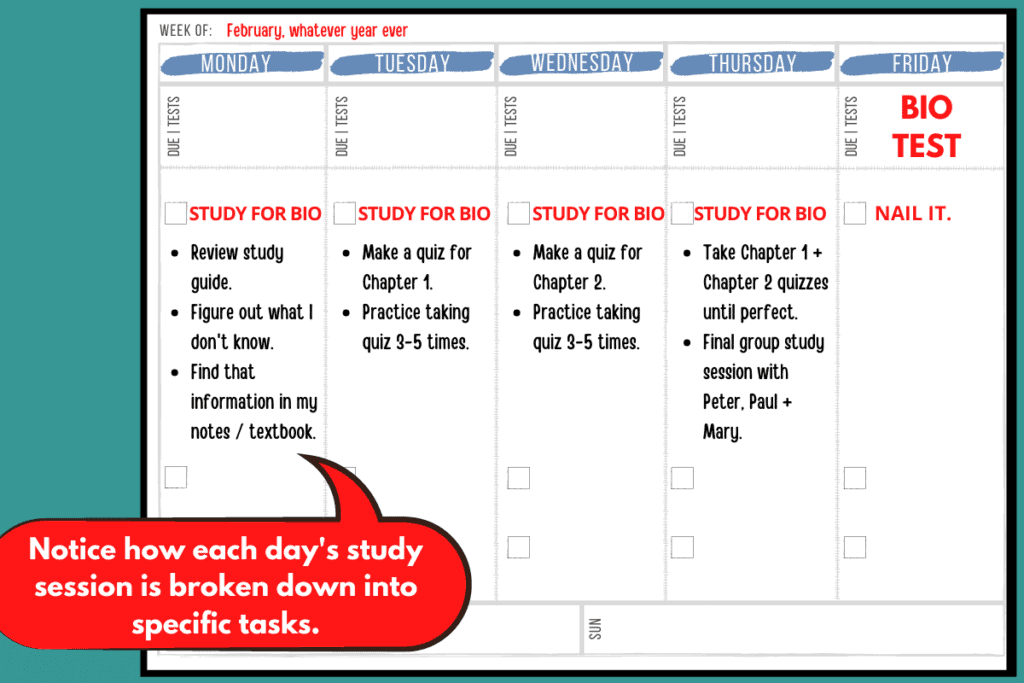
By Katie Azevedo, M.Ed.
A common complaint I get from students is “I don’t have enough time to study.” In most cases, the student has at least five days to study, but chooses not to start until the night before …
What’s usually happening here is that the student is prioritizing more concrete assignments over studying. (Here are the top 5 time management mistakes students make – are you making any of them?)
When a task is concrete and measurable — like read 15 pages, answer 10 questions, or complete a math worksheet — it’s easier for our brains to find time to complete it.
On the other hand, time management can be tricky when the work isn’t urgent, concrete or easily measurable. For students, the most abstract task of all is studying. “Studying” as an action can be difficult to measure because the task is open-ended, and the word “to study” is insanely vague.
Here’s an interesting article from Harvard that explains why long-term tasks (like studying) are more difficult to manage.
Planning time to study: 3 time management tips
First things first: this is how much time I recommend high school students study each day.
1. Understand that “studying” is a task, in the exact same way that “read 15 pages” is a task.
Even though your test may be in five days, which makes it seem less important than the worksheet due tomorrow, you must shift your mindset and give the task some urgency and structure. Here’s how.
2. Schedule time to study, in a homework agenda, the same way that any other assignment needs to be written down.
You should be using a homework tracker like this one or this one, which I used in the image below, or an assignment notebook (here are tips for choosing an assignment notebook). This basic school habit is non-negotiable. Assuming you’re already doing that, make sure you schedule specific times to study each day, just as you would schedule other homework or appointments. For example, if it’s Monday and you have a test on Friday, you should plan to study between 25-45 minutes each day leading up to the test. Write this down in your agenda. Be specific and concrete with when exactly you will study. This is a strategy called spaced repetition, and it’s essential.

3. Know exactly what you’ll do during each scheduled study session.
Studying is not re-reading your notes. It’s not scrolling through your Google Slides or skimming a textbook chapter. Studying involves actively doing something with the material. If you’re not actively doing something with the material, you’re not studying. For each of the study sessions that you planned in step 2, you should know exactly how you will be studying.
Real studying must involve the following:
- Knowing what’s on the test
- Gathering all materials and information
- Testing yourself over and over and over again – here’s how
If you’re one of the ones constantly arguing, “I don’t have enough time to study,” then I challenge you to get honest with your mindset. Are you dismissing the task of studying because it’s not a typical “assignment”? Are you forgetting to schedule time to study in your actual calendar as if it’s an actual task to be completed? Hey — speaking about mindsets — do you have these top 3 mindsets of top-performing students?
Are you a parent? Get my FREE downloadable 10-page Guide To Teaching Your Child Time Management Skills. It’s really free. Nothing spammy or weird.
As you get older and move through college, graduate school, and eventually the professional world, most of your work will involve vague, difficult-to-measure tasks similar to what “studying” feels like to you now. That might sound like something your parent would tell you (sorry?), but I could not be more serious. Get this habit straight now, and you’ll thank me later.
If you need more, here are some practical ideas about how to find time to study.

